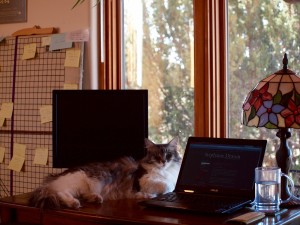 These little bushtits are such happy birds. They swarm the bark butter, singing a whispery tune and vanish again.
These little bushtits are such happy birds. They swarm the bark butter, singing a whispery tune and vanish again.
I’m going to take a bit of a departure today from my series on How My Day Job Has Made Me a Better Writer, but I’ll be back with it tomorrow.
I was talking with a Twitter friend who’s looking at having her first book published. She’s all agog with excitement, of course. And the online community has been great to her, with congratulations and support. Now, however, it’s hitting her that by the time the book comes out, people’s attention may have drifted and maybe no one will notice at all then.
She’s actually pretty insightful to recognize this pitfall.
See, for writers, attention is our most addictive drug.
We’re like affection-starved children who’ve grown up without human contact. It sounds dramatic, but so much of being a writer, especially in the early years, involves being alone with only your words for company. Nobody else sees your work, largely because no one cares, even if you dare tell anyone about it. You begin to feel like the mad scientist hermit, muttering to yourself, chasing some ever-mutating dream of creation. You become very accustomed to not being noticed. Even if you have a regular life, with people who love you, the crazy-writer side is usually locked away where she can’t frighten people.
Then, when she’s cleaned up enough to be trotted out into polite society and people pay attention to that side of you – and bettter, PRAISE you for it – well, it’s overwhelming. It’s like getting chocolate after a lifetime of rice. It’s rich and lovely and can totally screw you up.
Because, you see, the attention is almost instantly addictive. You find yourself craving just a little more. You start doing and saying things just to elicit a little more attention. You search for reviews and mentions. You reread old praise, reliving the glory days.
Before you know it, you’re the crack-whore on the corner of Twitter offering anything if people will just throw a crumb of attention your way.
I can’t tell you not to taste the attention. After all, it’s arguably one of the few rewards writers receive, until they’re really making the money. And besides, unless you’re a total recluse, you’re gonna get it. But know that it’s addictive. That it’s chocolate-covered heroin with no nutritious value.
In the end, the only thing that really matters is the writing.








